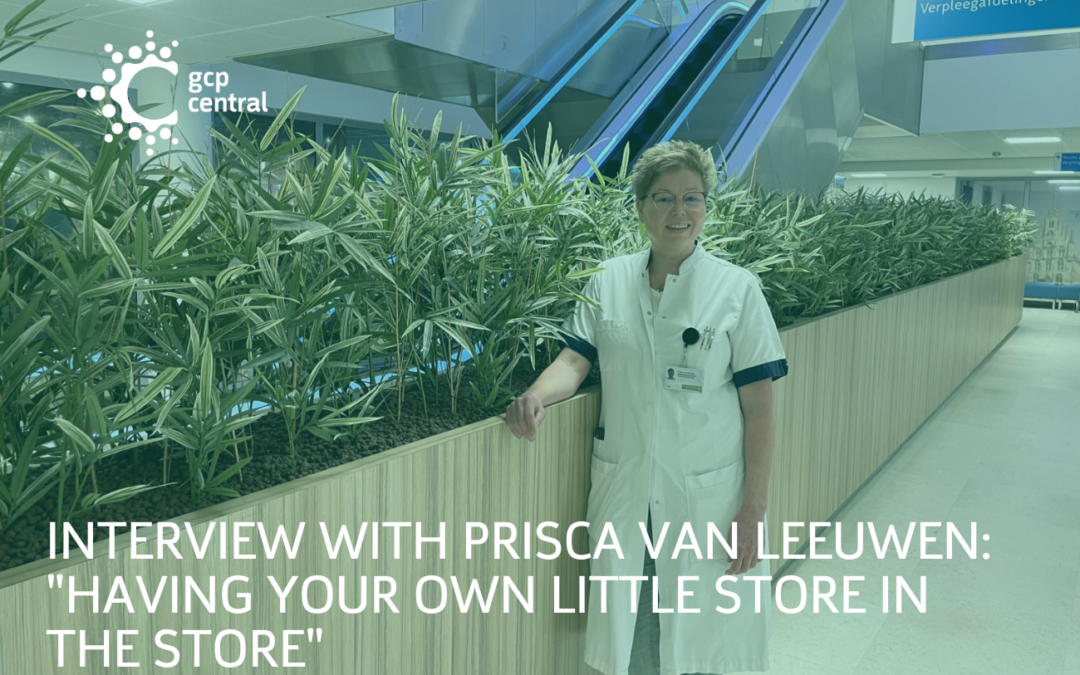GCP Central has now been in existence for more than 10 years. A time in which we have put all our energy, passion, and dedication into training the international community of medical scientific researchers on good clinical practice, or GCP, and locally applicable laws and regulations such as the Clinical Trials Regulation (CTR) and WMO. To ensure that scientific research is conducted following applicable laws and regulations. For a smooth process from start to finish. And, of course, for the safety of participants and patients.
We develop the courses for our clients and for you. We continuously show you what we are doing, what is changing, and where we are going. But how do you experience our training? What is your motivation to do research? How do you look at the laws and regulations? Is there resistance? Are the trainings practical? Is the knowledge gained applicable?
In this interview series, we portray people working in clinical research. This way, we learn from your experiences, and you may also be inspired by other people’s stories. We will visit research groups, hospitals, CROs, and pharmaceutical companies. We interview people with various roles within the world of science. This series has previously featured neurologist Anne van der Plas of Alrijne Hospital, research coordinator Manon Haanepen of Slingeland Hospital, general practitioner Jiska Meijer, co-founder of GPRI and researcher Jacintha Ronden of Cardialysis.
Prisca van Leeuwen is the one subjected to our Q&A this time. This good-humored pharmacy assistant from the Groene Hart Hospital has a passion for clinical trials. Her career started in the city pharmacy, but she has worked in the hospital pharmacy for 22 years. Almost immediately after she was inducted here, she also got involved with trials. “A colleague did it, and I liked it, so I started getting involved. And that just kept growing.” At first, it was all primitive; nothing went by computer. Prisca remembers well that back then, they still had to dial in the medications. “It seems like an eternity ago.” The facilities also left much to be desired. “We were always sitting between shelves, with a refrigerator.”
With the (paper) work increasing, the previous pharmacist arranged for Prisca and her colleague to have a separate room. Here, they can shut down and concentrate properly on all the forms and writing manuals. After her colleague leaves, Prisca does the trial work alone for a while. But after a complicated trial, she decides it’s better to do it together. She asks her current colleague, Karin, to join her. They each get half a day a week for it or a full day every other week. It’s not much, and is skimping on time. Now, in addition to the scheduled time, they do a lot in between. Cleaning up recipes, administrative tasks, and planning that still works in between. But when a study is set up, and they write the manual, you must get your head around it. The current pharmacist, Kaja, is aware of how much work it takes and makes an effort. The cooperation between the three women goes well, confirmed when Kaja comes in during the interview with a question about declaring a patient’s medication used from their own supply. Prisca knows all about that, too.
Currently, 18 studies are underway, and four more will be conducted soon. “That startup is not nothing, but if it runs, it runs,” she says. They write the manuals so that fellow pharmacy assistants can use them. And yet, “Usually when they hear the word trial, they immediately ask us about it.” Then Prisca is happy to help. Because she feels like she has her “own little store in the store. A little store that also has challenging logistics. By far, most of the tests that they prepare the medication for are done by oncology and cardiology. Cardiology is in another building in the hospital, so having patients come here was difficult. Therefore, medication is stored decentrally, which the pharmacy is responsible for. There is a special refrigerator there, whose temperature can be monitored remotely. “Temperature recording is a hot topic anyway. When a CRA comes by, they always want to know everything, including your refrigerators. Everything has to comply with laws and regulations, of course.” Laughing, she adds, “They have something every time.” But Prisca enjoys this collaboration and loves the variety and creativity this work requires of her. She always likes it when a CRA comes to check on them, and they get confirmation that they are on the right track. “Actually, we always get a compliment that it looks neat,” she says.
Because of her training at GCP Central, she understands well why the CRA, the doctors, or the hospital pharmacist have specific questions. Conversely, Prisca herself is critical of the research protocols she receives. For example, one proposal involved patients preparing their own syringes at home. Prisca and Karin reviewed the protocol and suggested areas for improvement. The pharmacist passes those plans on to the researchers, and the protocol is adjusted. This is one of the reasons Prisca enjoys trial work so much. “You really have to think about the process, think creatively, and approach a process or problem from multiple angles.”
All within the laws and regulations, of course. Prisca did two courses with us. She loved the in-depth training for pharmacy assistants. It is evident and accessible and really focused on the pharmacy. Moreover, you can also learn a lot from each other because there is a classroom with plenty of room for exchanging experiences. Here, Prisca knows a thing or two about how other pharmacists do things, but she also finds confirmation that “we’re not doing it so wrong at all.” This, of course, is in addition to the enormous amount of knowledge she gains during the training. Prisca is more critical of the EU CTR training she did last year. The material is more challenging, partly because it is not specifically for pharmacists. Because it is only e-learning, it lacks contact and exchange of experiences. Moreover, the e-learning must be done during work or at home, but then there must be time for it. Prisca finds it challenging to find time to sit on it long enough. She prefers a course day where she is out of the pharmacy for a while. So she would still like to take a blended training course.
Interestingly, one of the freebies from GCP Central’s newsletter hangs in the room where she works. The steps of clinical research include who is responsible for what per step. Prisca smiles when it is pointed out to her. Yes, she does use those. She looks at it when she feels something is going in the wrong order, usually too soon. Then, she can call others to account for it in an informed way, and the strings are pulled again for a while. Because meticulousness and accuracy are traits that absolutely fit the ideal pharmacy assistant and the trial work. It is noticeable from everything that this also applies to Prisca. Everything is neat and orderly. Privately, she prefers this and adds: Everything has its place, doesn’t it? I did have to let go of things because not everything can be organized entirely.”
Thus, we come to the conclusion that Prisca is cut out for this profession and that she does it with infinite pleasure. She can’t even name things she doesn’t like about trial work. She can only think of fun aspects. It starts with curiosity about the new investigational medication and delving into the drug. Write the manual as clearly as possible and arrange everything. Having your own little token is a lot of fun. And ultimately, the hope that it will contribute to curing patients. “It’s really an extension of the profession as a pharmacy assistant. It’s the front end of a new drug that might come to market.”
In short, Prisca is very enthusiastic and entirely in her place as a pharmacy assistant and in her additional position in trial work. She also puts her creative nature and accurate character to use privately. One of her greatest hobbies is music. She plays piano and flute but is mainly developing as a singer. For charity with the choir company in Indonesia, at a vocal writing boot camp, or when releasing her own EP. This energetic jack-of-all-trades ensures she has variety in all areas and gets to explore and organize new things.


